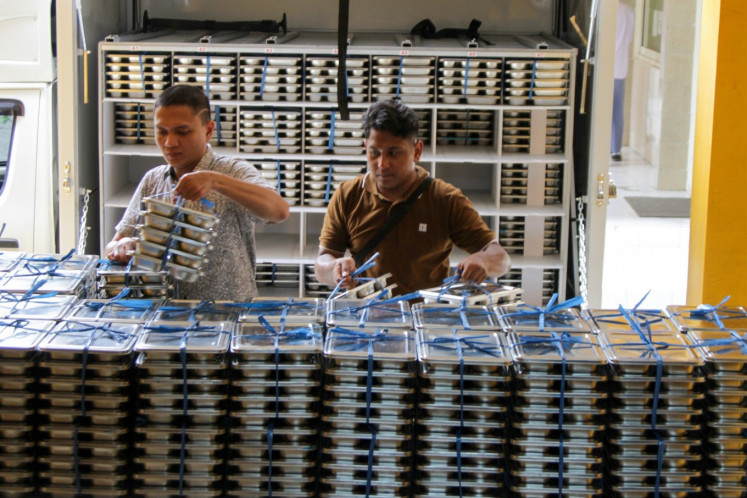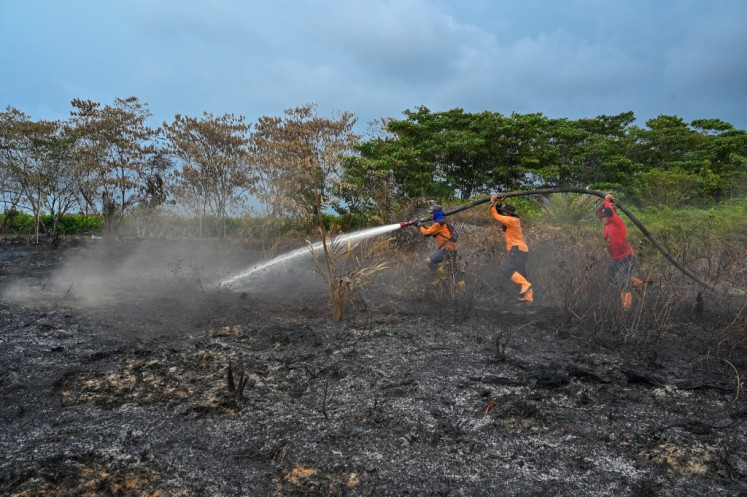Polish students bridge cultural gap
For 22 year-old soccer fan Szymon Kozlowski, the past year has been a great ride
Change text size
Gift Premium Articles
to Anyone

For 22 year-old soccer fan Szymon Kozlowski, the past year has been a great ride.
Not only was he a guest presenter on a soccer show on Bandung TV, the Polish exchange student was also in the PERSIB lineup, dribbling with the soccer club’s top players in an exhibition game. When he landed in Indonesia last September, he expected an unusual year, but not this “crazy”.
Szymon Kozlowski takes a break from his studies this year with a trip to Tangkuban Perahu. (JP/Tyler Branaman)
Along with students from across the globe, Szymon came to the country on the yearlong Darmasiswa program, a cultural exchange program offered by the Indonesian government since 1974.
After it was opened to Polish students in 1995, the program has recently enjoyed a rapid increase in popularity. Last year, 35 international students received this exchange scholarship, with five coming from Adam Mickievicz University in Poznan, Poland.
Zuzanna Mielniczuk’s knowledge of Indonesia was very limited prior to her Bahasa Indonesia classes at the Polish university: She knew only the name of the capital and the colors of the national flag.
As an Ethno-linguistics major, Zuzanna was curious about learning something completely alien to her across all aspects of her chosen field: grammar, thinking and culture. She was awarded the Darmasiswa scholarship in 2006 and was also placed in Bandung, albeit in a different university from fellow collegiate Szymon.
Even though it had been a long time since she’d last gone abroad, Zuzanna didn’t experience much culture shock during her stay.
“Obviously, there was some period of adjustment. After all, I was a 20 year-old European in Southeast Asia! The people looked different, they were speaking a foreign language,” she said in Bandung recently. “But I prepared myself mentally for these differences. I chose to be there, I knew what I wanted to get out of the experience. This mindset helped me beat any anxiety or homesickness.”
Szymon, on the other hand, despite the preparations he undertook – “reading books about Indonesia and Bandung, meeting people who were in Indonesia before, spending lots of hours talking to my Indonesian lecturer and browsing the Internet for information” – was overwhelmed by the sheer size of the country.
In fact, he continues to be in awe to this day. The different modes of transportation, daily life and the variety of foods astound him.
A Polish consul who has lived in Bandung for 30 years introduced him to the culinary delight otherwise known as fresh snake meat (“It tastes like chicken!” said Szymon), and a friend fed him some dog meat in Yogyakarta.
Zuzanna and Szymon concurred in their views on the subject of Indonesian timekeeping (or lack thereof). Nothing seems to run on time; not the public transport or the people, and in Szymon’s case, the already tight monthly scholarship allowance.
“In general, I like the Indonesian outlook on time, their patience and a more laid-back pace compared to the more stressful European lifestyle. But this laid-back attitude is somewhat abused, as it can quickly turn into laziness,” mused Zuzanna.
“Indonesians have to learn to respect another person’s time,” added Szymon.
As for female students, their exchange experience has armed them with an unusual cultural insight: that fending off potential suitors can become a problem.
Teija Gumilar, the Bahasa Indonesia lecturer at Adam Mickiewicz, revealed that he had received reports on female students constantly receiving unwanted male attention during their stay in Indonesia. According to Gumilar, one such student didn’t enjoy her stay in Indonesia because it was too tiring to deal with the antics of local men for an entire year.
The program is not without its flaws, either. Gumilar and the Indonesian Embassy in Warsaw heard frequent reports of absent lecturers and the lack of interesting material at the participating Indonesian universities.
“There should be a regular appraisal of the list of institutions involved, to keep standards high,” suggested Zelda Kartika, an Indonesian diplomat who served in Warsaw until late last year. At least a couple of students left the program because of the academic quality.
One of them, Magdalena Grzeszczak, decided to spend her time in Indonesia traveling and writing news stories, and then volunteered with the Polish Red Cross during the Yogyakarta earthquake.
Magdalena’s independent foray into Indonesian culture won her an award from the Polish Ambassador in Jakarta and from the rector of her home university.
The Indonesian bureaucracy has also reared its ugly head in the program.
Apparently, Szymon is not the only student who has had to wait for his overdue grant money. Luckily, the rector of Bandung’s Pasundan University intervened in his case, and he has since experienced no more problems.
It is also reported that students have very little time to make arrangements from the date they receive their scholarship notification to their intended arrival date in the country.
Zuzanna and others in her scholarship year had to scramble to book available plane tickets. As for two other students who had applied for the 2008 program, the lack of certainty forced them to withdraw.
Still, participating in the program allowed Zuzanna and Szymon to interact with people from different nationalities and backgrounds in the adventure of a lifetime. Most importantly, it gave them the chance to practice their Bahasa Indonesia, which brought them closer to the lives of ordinary Indonesians.
In retrospect, Zuzanna has realized that “living abroad for a year had shaped my personality. Despite the language and cultural barrier, it made me more independent”.
“And Indonesia helped me see the world in a wider perspective by teaching me to understand other people, respect its differences and learn from it. I am also more aware of the merits and disadvantages of my own culture,” she said in Poznan.
Since returning home, Zuzanna has been continuing her studies in the hope of becoming a translator.
As for Szymon, who also teaches English at a couple of high schools in Bandung, and who has been awarded an additional one-year scholarship from Pasundan University, he has several plans for his future, all involving Indonesia.
He sees Europe as a good market for Indonesian businessmen, and he wishes to promote Indonesia to others. He plans to come back often.
But for now, “I’m living my dream. And for that, I’ll always be grateful.”









